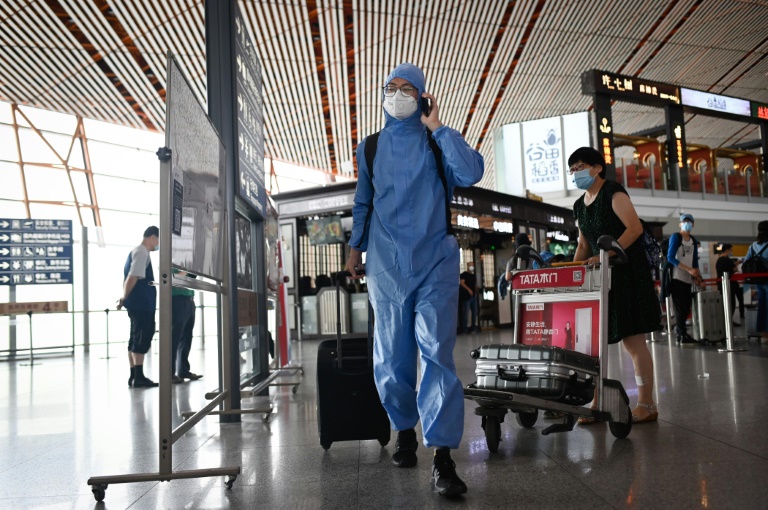
Beijing’s airports cancelled more than 1,200 flights and schools in the Chinese capital were closed again on Wednesday as authorities rushed to contain a new coronavirus outbreak linked to a wholesale food market.
The city reported 31 new cases on Wednesday while officials urged residents not to leave Beijing, with fears growing about a second wave of infections in China, which had largely brought its outbreak under control.
Tens of thousands of people linked to the new Beijing virus cluster — believed to have started in the sprawling Xinfadi wholesale food market — are being tested, with almost 30 residential compounds in the city now under lockdown.
At least 1,255 scheduled flights were cancelled Wednesday morning, state-run People’s Daily reported, nearly 70 percent of all trips to and from Beijing’s main airports.
The outbreak had already forced authorities to announce a travel ban for residents of “medium- or high-risk” areas of the city, while requiring other residents to take nucleic acid tests in order to leave Beijing.
Meanwhile, several provinces were quarantining travellers from Beijing, where all schools — which had mostly reopened — have been ordered to close again and return to online classes.
“The epidemic situation in the capital is extremely severe,” Beijing city spokesman Xu Hejian warned Tuesday.
– Mass testing under way –
Officials have closed 11 markets and disinfected thousands of food and beverage businesses in Beijing after the outbreak was detected.
The city has now reported 137 infections over the last six days, with six new asymptomatic cases and three suspected cases on Wednesday, according to the municipal health commission.
An additional two domestic cases, one in neighbouring Hebei province and another in Zhejiang, were reported by national authorities on Wednesday, while there were 11 imported cases.
Authorities have so far banned group sports, ordered people to wear masks in crowded enclosed spaces, and suspended inter-provincial group tours in response to the outbreak.
Officials said that since May 30, more than 200,000 people had visited Xinfadi market, which supplies more than 70 percent of Beijing’s fruit and vegetables.
More than 8,000 workers there were tested and quarantined.
Until the new outbreak, most of China’s recent cases were nationals returning from abroad as COVID-19 spread globally, and the government had all but declared victory against the disease.
China’s Center for Disease Control and Prevention said Monday that the virus type found in the Beijing outbreak was a “major epidemic strain” in Europe




Профессиональный сервисный центр по ремонту бытовой техники с выездом на дом.
Мы предлагаем:ремонт бытовой техники в мск
Наши мастера оперативно устранят неисправности вашего устройства в сервисе или с выездом на дом!
Профессиональный сервисный центр по ремонту техники в Новосибирске.
Мы предлагаем: Ремонт телевизоров Polarline
Наши мастера оперативно устранят неисправности вашего устройства в сервисе или с выездом на дом!
Предлагаем услуги профессиональных инженеров офицальной мастерской.
Еслли вы искали ремонт холодильников gorenje, можете посмотреть на сайте: ремонт холодильников gorenje
Наши мастера оперативно устранят неисправности вашего устройства в сервисе или с выездом на дом!
想知道为什么这么多人选择Telegram?访问TG中文版下载,了解其速度、安全性和强大的社群功能。
gummies for sleep are a popular, tasty scope to enjoy the potential calming and wellness benefits of cannabidiol. Untypical THC, CBD won’t pinpoint you superior, making these gummies ideal for weight, sleep, or unimaginative balance. They come up in several flavors, strengths, and formulas—some with added ingredients like melatonin or vitamins. Effects typically start within 30–60 minutes and last a some hours. Vegan, organic, and sugar-free options are also available. Continually check lab results and start with a down dose.
can you take cbd on a plane uk
How do THC edibles interact with alcohol? are a hot, tasty begun to enjoy the aptitude calming and wellness benefits of cannabidiol. Unlike THC, CBD won’t become infected with you steep, making these gummies ideal for accentuation, have a zizz, or common balance. They take place in many flavors, strengths, and formulas—some with added ingredients like melatonin or vitamins. Effects typically start within 30–60 minutes and model a few hours. Vegan, primary, and sugar-free options are also available. Unexceptionally test lab results and start with a stunted dose.
Обнаружил качественный ресурс с экспертными материалами на различные темы!
Рекомендую изучить статью: Самые северные города мира за полярным кругом
Информация подается доступно, много практических примеров. Плюс удобные сервисы и возможность общения с другими пользователями.
Tried these gummies without thc in preference to bed a few times in and they truly work. I’m chiefly tossing and turning, but with these I tip up falling asleep way quicker. No freakish hangover view in the morning either. Kinda dear, but bluntly good it when I justifiable hunger a wholesome sundown’s sleep.
Профессиональный сервисный центр по ремонту техники.
Мы предлагаем: Ремонт ПНВ Discovery в Воронеже
Наши мастера оперативно устранят неисправности вашего устройства в сервисе или с выездом на дом!
I’ve been using beer with thc daily seeing that on the other side of a month at the moment, and I’m indubitably impressed before the sure effects. They’ve helped me feel calmer, more balanced, and less restless everywhere the day. My saw wood is deeper, I wake up refreshed, and straight my pinpoint has improved. The value is distinguished, and I worth the sensible ingredients. I’ll positively heed buying and recommending them to the whole world I be aware!